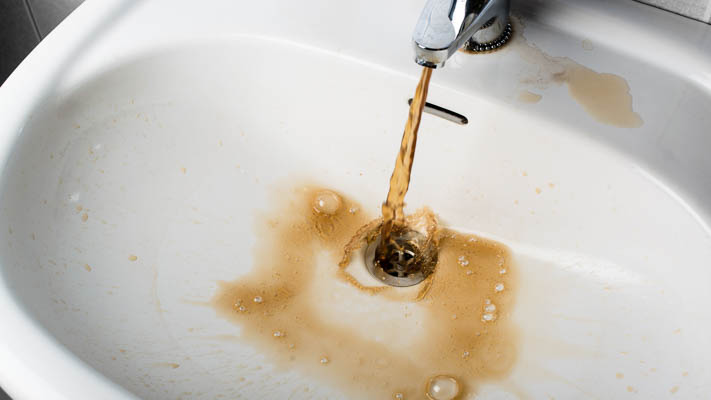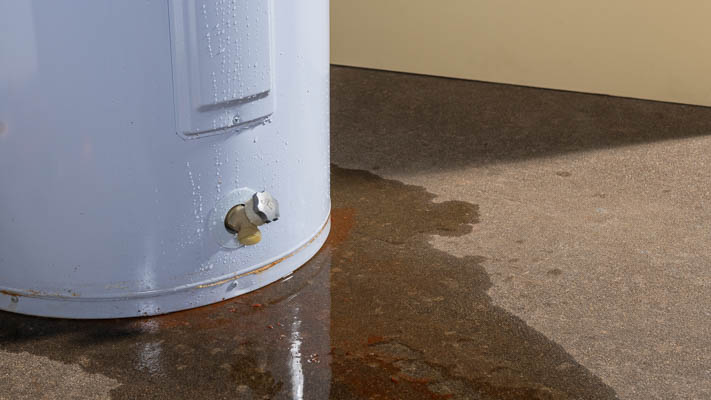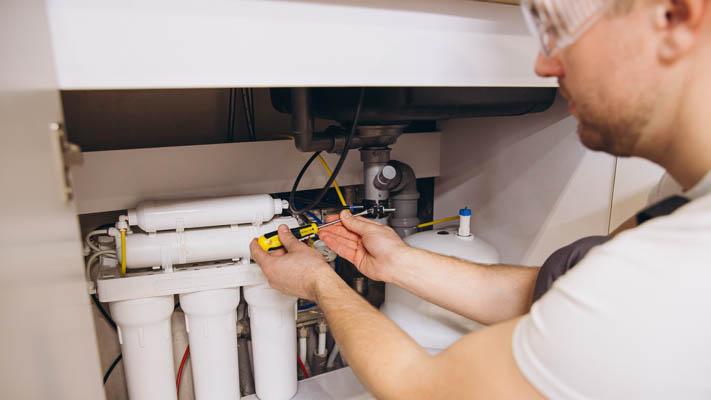Can a Water Filtration System Remove Rust?
Water filtration systems can help reduce rust in drinking water, but their effectiveness depends on the type of filter, the form of iron present (dissolved vs. particle), and the condition of your home's plumbing. Below are some of the most common options and how well they work against rust:
Pitcher Filters (e.g., Brita)
Pitcher filters (e.g., Brita) are designed for improving taste and reducing chlorine, not for removing rust. If your water is visibly orange or brown, these filters will clog quickly and provide only minimal improvement. They are not a long-term solution for rusty water.
Reverse Osmosis Systems
Reverse osmosis (RO) systems, such as APEC Water's Reverse Osmosis filters, are highly effective at removing dissolved iron and rust particles from drinking and cooking water.
By forcing water through a semi-permeable membrane, RO systems capture extremely fine contaminants. However, RO systems filter water only at a single tap (usually the kitchen sink) and do nothing to address the root cause of rust if it originates from corroding pipes.
Iron Filters (Oxidizing Filters)
Specialized iron filters use a "media bed," such as manganese dioxide, to oxidize and capture dissolved iron. These systems can be very effective if your water source naturally contains high iron levels (for example, well water). They're less effective if the iron comes from deteriorating galvanized pipes inside your home.
Whole-Home Sediment Filters
Whole-home filtration systems, like Aquasana's whole-house water filters, are installed at the main water line to treat water before it reaches faucets or appliances.
These systems may include sediment filters that trap larger rust particles, as well as multi-stage filters that target other impurities such as chlorine, scale, and sometimes iron. By treating water at the source, whole-home systems help protect plumbing, fixtures, and appliances from staining, corrosion, and buildup.
Depending on the system, some whole-home filters can handle moderate levels of iron and reduce the appearance of rusty water. However, they require routine maintenance and filter replacements to stay effective. They also will not solve the underlying problem if the rust originates from corroding pipes, such as outdated galvanized steel plumbing.

Filtration can reduce the symptoms of rusty water, especially if the source is naturally occurring iron in your supply. This is common in places like Oregon, where elevated iron levels occur in local water sources.
But if the rust comes from old galvanized steel pipes inside your home, no filter can provide a permanent solution. In those cases, replacing the pipes is the only way to eliminate rust at its source.
Can Rust in Water Damage Pipes and Appliances?
Even if rusty water is not usually harmful to your health, it can still cause damage around your home. Rusty water often leaves a trail of problems that worsen over time, including:
- Stains and buildup: Rust particles can stain sinks, bathtubs, and laundry. Over time, the iron content may also create scale and deposits inside your plumbing, restricting water flow.
- Appliance damage: Water heaters, washing machines, dishwashers, and even coffee makers are at risk if rust-laden water continues to flow through them. Sediment buildup can shorten their lifespan and reduce efficiency.
- Plumbing strain: If rust appears due to old galvanized steel pipes, corrosion is happening inside the pipes themselves. This weakens the pipe walls, making leaks, cracks, and bursts more likely, while also causing issues such as low water pressure.

What starts as a cosmetic issue can quickly turn into a costly plumbing repair. That's why rusty water should never be ignored – it's a clear visible sign of hidden damage in your system.
How Do I Permanently Fix Rusty Water at Home?
When it comes to permanently fixing rusty water caused by outdated plumbing, the reality is clear: no filter or temporary repair will solve the problem if the source is old, corroded pipes. The only true long-term solution is a full home repipe.
Homes built before the 1960s often used galvanized steel pipes, which corrode from the inside out and release rust particles into the water supply. Once rust forms inside the pipe walls, the process can't be reversed. Even if you install filters, replace appliances, or repair sections of plumbing, the rust will continue spreading until every galvanized pipe is eventually compromised.
That's why partial repiping is rarely cost-effective. Replacing one section leaves the rest of the galvanized network intact, meaning rust and corrosion will simply reappear elsewhere. Homeowners who try this piecemeal approach often end up paying more in the long run – both in plumbing costs and in potential water damage from leaks.
A full home repipe, on the other hand, replaces every outdated galvanized pipe with modern, corrosion-resistant materials such as PEX tubing or copper. This ensures:
- Clean, rust-free water in every faucet and fixture
- Improved water pressure, since new pipes aren't clogged with sediment
- A stronger plumbing system, far less prone to leaks, bursts, or failures
- Long-term peace of mind, knowing your water supply is no longer flowing through rusted, decades-old steel
For most homeowners, the benefits of a full repipe far outweigh the costs. Not only does it eliminate rusty water at its source, but it also modernizes your plumbing system for decades to come. Think of it less as a repair and more as an investment in the safety, comfort, and value of your home.
Get your free estimate today
With over 75,000 repipes completed, we've perfected our One-Stop Repipe™ for your home.
Get a Quote to Replace Rusty Pipes
Here at Repipe Specialists, we've fully replaced the plumbing in over 75,000 homes since 1991, upgrading outdated, rust-prone pipes such as galvanized steel with durable copper piping or reliable PEX tubing. Many homeowners come to us after noticing rusty water or pipe corrosion, and we've helped them enjoy clean, worry-free plumbing again. Our customers regularly share positive feedback about their repipe experience, often saying we exceeded expectations on:
- Speed: Our repipe crews typically complete a repipe in a day, returning on another day for wall patching.
- Convenience: Through our One-Stop Repipe™ Process, we handle everything from permits, to wall patching, to inspections.
- Cleanliness: Our crews are trained to protect your home while working (we cover all surfaces with protective sheeting), and to clean up fully at the end of each day.
- Peace of Mind: Repipe Specialists is a fully licensed plumber in every state we operate in, and we back all of our repipes with a lifetime warranty.
- Financing programs: To help take the sting out of unplanned repipe expenses, we offer several financing programs.
- Price: As a specialist that performs hundreds of repipes a week, we can deliver high-quality repipes at a lower cost vs generalist plumbers. We have an article that covers repipe cost factors in detail. Our quotes typically range from $4,500 to $15,000 depending on the size and complexity of your project.
Schedule a free in-home consult, and one of our local repipe specialists will explain your options for replacing rusty galvanized steel pipes and provide a written, fixed-price quote.

